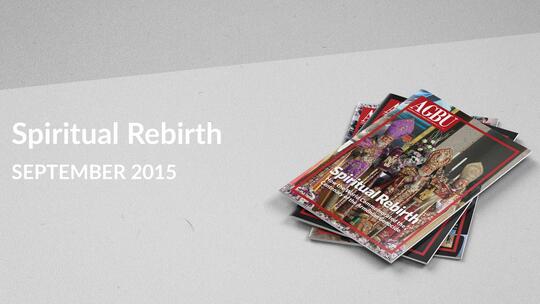It was not the first time Armenia had entered Eurovision, the annual song competition organized by Europe’s public broadcasters. But this year’s entry to the musical event, initially created in 1956 to unite post-war Europe, was the country’s most contentious yet. A fiery power ballad that accommodated a wide array of voices, “Don’t Deny” featured a sophisticated crew of Armenian artists who formed a band called Genealogy for the May 2015 event held in Vienna.
The group included an artist from each inhabited continent: Essaï Altounian from France, Tamar Kaprelian from the United States, Stephanie Topalian from Japan, Vahe Tilbian from Ethiopia and Mary-Jean O’ Doherty Vasmatzian from Australia. Inga Arshakyan, who represented Armenia in 2009, made up the gravitational center of the group. According to their official Eurovision biography, members of Genealogy were “united by the blood in their veins, which contains Armenian genetics, and by music as the universal language of the world.”
Opinions in and out of Armenia were divided on the song, but “Don’t Deny” caused controversy beyond simple musical preference. As early as March, Armenia’s Eurovision committee needed to deny that “Don’t Deny” had motives beyond a regular entry into the contest. Critics saw the song as alluding to the Armenian Genocide, while its supporters emphasized its themes of family, unity and love. In response to perceptions of the song as politically charged, Armenia changed the title to "Face the Shadow," which was welcomed by the European Broadcasting Union and the Eurovision Song Contest Reference Group.
Battlefield: Eurovision
The controversy was not unfamiliar territory to Armenia or its neighbors. The South Caucasus have injected a fascinating brand of drama into the stage, as long-standing local differences and disputes have played out in real time and come into the homes of viewers around the world.
Perhaps the best example of this phenomenon happened in 2009, when a video montage featured the “We Are Our Mountains” statue, which has become eponymous with Nagorno-Karabakh, and upset Azerbaijan. The image was edited out during the final, but in retaliation, Armenia, represented by singer Sirusho, snuck in images of the monument as Eurovision presented voting results.
That year, Azerbaijanis who were found to have voted for Armenia were called in for questioning, with the BBC speaking to one man who was accused of being unpatriotic and a “potential security threat,” because had voted for Armenia.
Not wanting to be left behind, Georgia entered the same year with a song called “We Don’t Wanna Put In,” which referenced its grievances with Russia and its leader Vladimir Putin. The song was rejected by Eurovision authorities. Georgia, insisting the message was not political, refused to change the entry and ultimately withdrew from the contest.
In 2012, when Azerbaijan won the right to host the contest, Armenia withdrew, citing inflammatory statements by Azerbaijani President Ilham Aliyev who called Armenians the country’s “main enemy.”
Paul Jordan, a London-based Eurovision expert whose knowledge on the topic has earned him the nickname of Dr. Eurovision, has attended the contest in person for over a decade. On a visit to Baku, Jordan saw firsthand the tension that erupted when a DJ at a European club played an Armenian song while an Azerbaijani singer was on the dance floor. The atmosphere immediately changed.
“That kind of level of mutual hatred goes deep, and it was very uncomfortable for me to witness,” he said in an interview. “It’s funny watching those grievances play out right in front of you, but that’s what Eurovision offers. It allows you a glimpse into the internal politics of countries."
The commotion has been interpreted as a sign of how seriously the Caucasus states take the contest, a complete departure from the attitude of Western European countries, who anxiously wait for Eurovision to end.
In large part, this attitude is because for one night, Armenia, Azerbaijan and Georgia, countries who rarely make the daily international news, have a chance to position themselves in all their glory before an international audience.
“It taps into a wider issue about being part of Europe and being visible,” said Jo Laycock, a senior lecturer in history at Sheffield Hallam University in the United Kingdom who studies the history of modern Armenia. “If you can’t join the European Union, then Eurovision will do for now.”
And what better way to command the world’s attention than with a group whose members identify with five different continents.
A Show of National Unity
This time, Armenia harnessed the power of its most powerful and uniquely global tool: the diaspora.
In doing so, Eurovision did much to connect Armenia and the diaspora. One hundred years after the genocide scattered Armenians from Brazil and Canada to Syria and France, Armenia and the diaspora, which have often struggled to stay in sync on political, cultural and social issues, looked to be united on a European stage.
Armenian President Serzh Sargsyan used the opportunity to discuss the merits of the diaspora and Armenia working in harmony. “These events confirmed one thing,” he said after presenting the group with passports and Armenian citizenship. “If we join together and unite around a single idea, we always achieve success.”
Many Armenians in the diaspora, whose voting power is spread across dozens of countries in Europe, rallied behind the group. Despite this synchronicity, it was not meant to be Armenia’s year at Eurovision 2015, ranking 16th after having been placed in the top 10 six times in years past. “It wasn’t about winning or losing for us this year, it was about telling our story in an honest way and showing the world that we have survived,” said Kaprelian.
The message of “Face the Shadow” might have been lost on the larger audience, but this one small step in the world of Eurovision meant one very large step for Armenia-diaspora relations.






